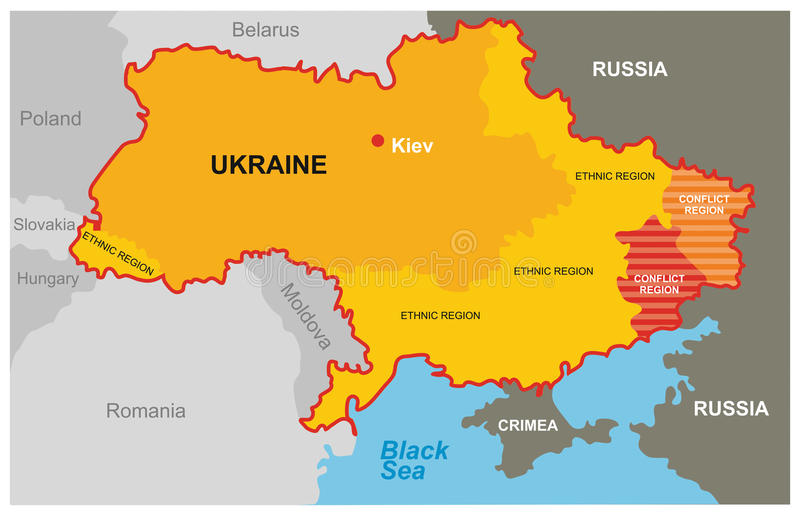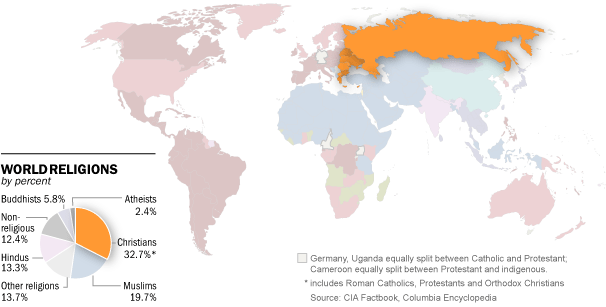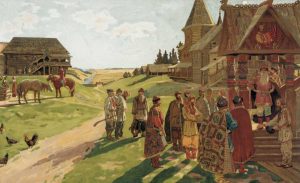
Views: 864
Over the past few weeks, the degree of tension between Constantinople and the Moscow Patriarchate has significantly grown. The meeting of the two patriarchs, not expected to be fruitful, took place on August 31 and on September 7, the Ecumenical Patriarchate announced the appointment of its exarchs (plenipotentiaries) in Ukraine.
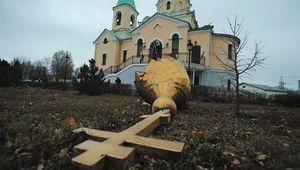 The struggle for the Ukrainian Orthodox Church has become the main theme of the world Orthodoxy during the last six months. Many are inclined to see this as a confrontation between the two capitals of the Orthodox world – Constantinople and Moscow, the “second” and “third” Rome. Both Ecumenical Patriarch Bartholomew and Patriarch Kirill of Moscow and All Russia claim their canonical rights to the Ukrainian lands. For both, the battle for Kiev is of utmost importance: the winner will consolidate the title of the head of the Orthodox believers and severely undermine the opponent’s authority.
The struggle for the Ukrainian Orthodox Church has become the main theme of the world Orthodoxy during the last six months. Many are inclined to see this as a confrontation between the two capitals of the Orthodox world – Constantinople and Moscow, the “second” and “third” Rome. Both Ecumenical Patriarch Bartholomew and Patriarch Kirill of Moscow and All Russia claim their canonical rights to the Ukrainian lands. For both, the battle for Kiev is of utmost importance: the winner will consolidate the title of the head of the Orthodox believers and severely undermine the opponent’s authority.
However, the triumph of one of them will be ruinous for the Orthodoxy as a whole – a painful Ukrainian question will likely cause another historical schism in Orthodox Christianity. Patriarch Kirill is already threatening to cut ties with Constantinople in case the latter provides the Tomos of autocephaly. It is not necessary to explain what consequences implies the withdrawal of more than 100 million of believers from the omophorion of the Ecumenical Patriarch. The Christian world would become truly multipolar: alongside with Catholic Rome we’ll witness two more – “Constantinople Rome” and “Moscow Rome” – all struggling to expand their influence.
Why is Constantinople against Moscow?
In the current situation, the “Doomsday Clock” of Orthodoxy is closer than ever to midnight. The meeting of the two patriarchs on the last day of summer was designed to defuse the situation, but, apparently, provoked Bartholomew to an even tougher anti-Moscow rhetoric than before. He once again designated the rights of Constantinople to Ukraine, declaring the illegitimacy of the letters on the transfer of the Kyiv Patriarchate to Moscow in the 17th century. In his speech (for some reason published not on the official portal of the Ecumenical Patriarchate but on the website of the UOC in the US), he also showed truly ecumenical ambitions, identifying the Patriarchate of Constantinople with the “leaven”, that is, with the quintessence of the Orthodox faith, and accused those who “do not respect the decisions of Fanar”, of disrespect to the Orthodoxy in general.
Nevertheless, on the eve of the meeting of the two patriarchs, the anti-Moscow sentiments in the Ecumenical Patriarchate were triggered from outside. So, on August 27, the Associated Press published an article in which Russian intelligence agents were accused of hacking the e-mail accounts of the Ecumenical Patriarchate hierarchs. In May, the Order of St. Andrew that represents the interests of the Fanar in the United States blamed Moscow for disseminating information about the ties between Constantinople and the Islamic preacher Fethullah Gülen. One can also recall the events of 2016, when the ROC and several Orthodox Autocephalous Churches ignored the Council of Crete convened by Bartholomew. According to sources close to Bartholomew, he considered this a personal insult from Patriarch Kirill. Besides, the Patriarch of Constantinople intends to show Kirill once and for all who is the “boss” in the Orthodox world.
A possibility to avoid the split
But should the head of the Ecumenical Patriarchate be guided by personal motives in dealing with such complex issues as granting autocephaly to the Church in a country that is drawn into the war in its eastern regions, an economic crisis and internal disputes? According to the aforementioned sources, many of Fanar hierarchs clearly understand the consequences of the autocephaly, but this issue is supervised by Bartholomew personally and he is not ready to make concessions.
Unfortunately, in this situation, there is only one option that will more or less suit both sides and, most likely, will not lead to a split. This is an Exarchate of Constantinople in Ukraine. Bartholomew will receive his share of influence in this predominantly Orthodox country, and Kirill will preserve some of his positions. In the current situation, granting the Tomos to the pro-government Church will by default lead to a sharp increase in pressure on the part of believers and clergymen, who have at least some ties with Moscow. Given the number of believers of the Ukrainian Orthodox Church of the Moscow Patriarchate (according to the most biased estimates – at least 20%) and their prevalence throughout the country, this can lead to a large-scale interfaith clashes. It is extremely important not to allow this to happen and create a single Autocephalous Church in Ukraine only after the conflict is resolved. At the same time, despite any objections from Moscow, this process should be implemented by Constantinople, and not by the ROC, whose image has been highly demonized by Kiev.
It would be great this is understood at the Fanar, and Archbishops Daniel of Pamphylia and Hilarion of Edmonton, appointed on September 7, would engage in “healing the schism”, that is organizing a “peacemaking exarchate” and setting up the process of reunion of the divided believers.
Another factor that complicates the autocephaly bestowal is the issue of choosing the new Church’s head. The Primate of the UOC of the Kyivan Patriarchate Filaret is considered to be the main contender for this post, but a great number of complexities are associated with his name. In 1997, for attempting to achieve independence of the Ukrainian Orthodox Church, the Moscow Patriarchate anathematized Filaret, which was de facto recognized by all local Orthodox Churches. The “Kyivan Patriarchate”, created by Filaret, did not receive recognition in the Orthodox world and is still considered “uncanonical”. Alongside with the fact that Filaret himself carried out a rather aggressive policy outside of Ukraine, seizing parishes on the territories of other local Churches and supporting various non-canonical communities around the world, he earned an unsavory reputation in Orthodoxy.
The world of Orthodox Christianity is quiet and very conservative. Despite the changing political situation in Ukraine, no one has rehabilitated Filaret so far (therefore, even in the speech of Bartholomew his title “patriarch” stands in inverted commas), and the UOC-KP created by him remains unrecognized. Sudden abolition of the anathema and recognition of the head of the Kyiv Patriarchate is a troublesome task and will hardly have a positive impact on the reputation of the Fanar, especially considering that the Patriarch of Constantinople has recognized this anathema for 30 years, avoiding meetings and joint services with the “Kyivan Patriarch”. In addition, Bartholomew hardly forgot how Filaret denied Constantinople the autonomy of the UOC-KP and the UAOC as parts of the Ecumenical Patriarchate back in 2008. Now, the Fanar is rumored to avoid appointing Filaret Primate of the new Church, which makes him seek options to fortify his position.
However, whoever becomes the leader of the new Ukrainian Church, one thing is obvious: its creation at this point of time will have devastating consequences for the entire Christian world. Now everything depends on Ecumenical Patriarch Bartholomew. He is already compared by many with the notorious Patriarch Melety IV, who managed to rule three local Churches, introduced the Gregorian calendar, incorporated into the Constantinople Patriarchate the Finnish and Estonian Archdioceses, which had belonged to the Russians, advocated unification with the Anglican Church, was a member of the Masonic Grand Lodge of Greece and even tried to implement the second marriage for the clergy, which is as unthinkable for the Orthodox Christians as the second marriage of laymen for the Roman Catholics.
By the way, incumbent Patriarch Bartholomew has already managed to “authorize” the second marriage for clergymen at a recent meeting of the Synod of the Constantinople Church. Now he faces a historic choice: to be remembered in the Christian chronicles as a peacemaker, a progressive fighter for the environment and equality, or as the initiator of the bloodiest religious division in Europe in the 21st century.
The question is whether he will take a decision that will move the “Doomsday Clock” to midnight, or whether the “judgment day” of Orthodoxy will be postponed.
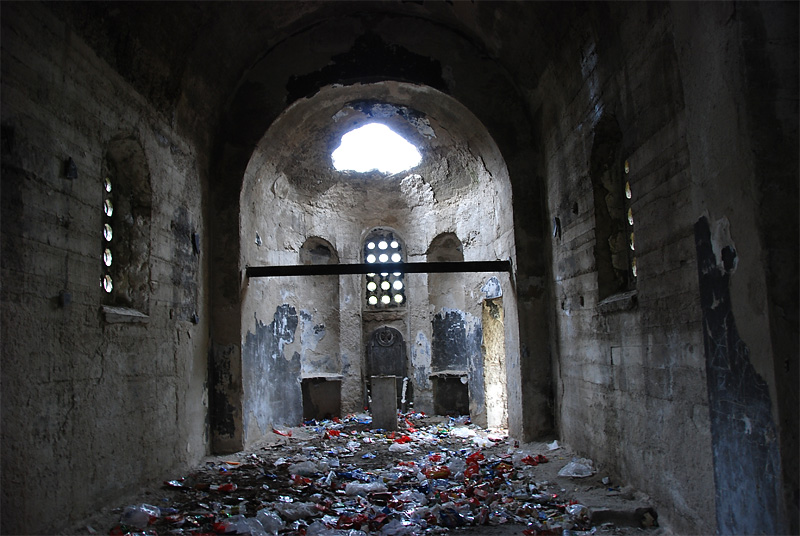
Author: Boiko Hristov
Origins of images: Facebook, Twitter, Wikimedia, Wikipedia, Flickr, Google, Imageinjection & Pinterest.
Read our Disclaimer/Legal Statement!
Donate to Support Us
We would like to ask you to consider a small donation to help our team keep working. We accept no advertising and rely only on you, our readers, to keep us digging the truth on history, global politics and international relations.
FOLLOW US ON OUR SOCIAL PLATFORMS


